Search the Special Collections and Archives Portal
Search Results
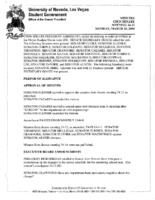
Meeting minutes for Consolidated Student Senate, University of Nevada, Las Vegas, March 29, 2004
Date
Archival Collection
Description
Text

Transcript of interview with Otto Merida by Claytee White, May 18, 2017
Date
Archival Collection
Description
When looking back on his legacy in the Latinx community of Las Vegas, Otto Merida (1945 - ) takes great pride in being a Latin Chamber of Commerce [LCC] co-founder with Arturo Cambeiro. With the LCC, they forged a powerful economic entity that continues to provide the local Latino community with social and political influence. Growing up during the 1950s in Havana, Otto Merida fondly remembers his childhood despite living under the dictatorship of Fulgencio Batista. There were the murmuring sounds of explosions from afar on the way to baseball games, but also the warm Sunday family meals of Cuban soup with fideos. In this interview, he talks about the rising communist powers inspired by revolutionary Fidel Castro and the events that led his family to place him in the Peter Pan Program in 1961. The Peter Pan Program sent unaccompanied Cuban children to the United States to avoid potential instruction by Castro’s government. Merida still holds on to his mother’s final request upon leaving Cuba-“I want you to remember the address where we live and the phone number: Josefina 68-entre primera y segunda-La Víbora, Havana con el teléfono X4304.” As a part of the Peter Pan Program, Merida experienced a nomadic childhood living in barracks in Miami and a three-story home in Wilmington, DE. The only connection he had to his family were a series of letters he exchanged with his mother, until they reunited years later in Miami. For Merida, life on 79th Street and Biscayne Boulevard in Miami was defined by the values of his family and other Cubans and African Americans in his neighborhood. v Merida earned his bachelor’s degree in Political Science from the University of Florida. He credits his sister-in-law with a pivotal role in his decision to pursue a higher education. His engagement in politics continued through his involvement with the Cuban Circle, the first Hispanic community to be involved with politics in Las Vegas. He describes the migration of Cubans to the casino scene of Las Vegas and the presence of Cubans in the community. His work with the Cuban Circle inspired him to develop a political presence for Hispanics in the community. While travelling across the United States before settling in Las Vegas, Merida made many significant relationships while working with associations such as the Fitchburg Chamber of Commerce and Volunteers in Service to America [VISTA]. Living in Las Vegas, Otto Merida worked as an educator and community organizer. In the late 1970s, Merida and Arturo Cambeiro collaborated to create the Latin Chamber of Commerce of Las Vegas. For Merida, the Chamber consistently goes above and beyond the vision he and Cambeiro had created when they first opened their doors. From the creation of the Latino Youth Leadership Program at UNLV to their work alongside political figures such as Senator Catherine Cortez-Masto, Merida is extremely proud of the various accomplishments of the Chamber. Now as President Emeritus, Otto Merida continues to dedicate himself to the Chamber as a volunteer and serves as one of the many Latinx Voices of Southern Nevada that have shaped the greater Las Vegas community.
Text
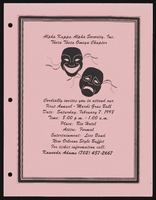
Alpha Kappa Alpha Sorority, Theta Theta Omega Chapter Mardi Gras Ball fliers and newspaper article
Date
Archival Collection
Description
From the Alpha Kappa Alpha Sorority, Incorporated, Theta Theta Omega Chapter Records (MS-01014) -- Chapter records file.
Text
Henderson Public Library Photograph Collection on Henderson, Nevada
Identifier
Abstract
The Henderson Public Library Photograph Collection on Henderson, Nevada (approximately 1940-1988) depicts life and growth in Southern Nevada. The collection documents the growth of Henderson, Nevada through images of Basic Magnesium Incorporated, housing throughout the area, and events. The documentation of Basic Magnesium Incorporated, its activites, personnel, and buildings from 1942 through 1944 is prominent in this collection.
Archival Collection
Audio clip from interview with Eugene Williams conducted by Claytee D. White, July 17, 2008
Date
Archival Collection
Description
Audio clip from interview with Eugene Williams. In the clip, he recalls the prejudices that he and other black musicians faced during the 1970s.
Sound
Audio recording clip of interview with Rev. Prentiss Walker by Bernard Timberg, January 27, 1974
Date
Archival Collection
Description
Part of an interview with Rev. Prentiss Walker conducted by Bernard Timberg on January 27, 1974. Walker describes discrimination during Hoover Dam construction and life in Las Vegas prior to segregation.
Sound
Audio recording clip of interview with Essie Shelton Jacobs by Claytee D. White, February 1, 1996, and April 15, 1996
Date
Archival Collection
Description
Part of an interview with Essie Shelton Jacobs by Claytee White on February 1, 1996 and April 15, 1996. Jacobs discusses her role as a shop steward in the Culinary Union and describes community relations with the union.
Sound
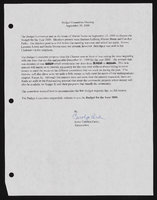
Alpha Kappa Alpha Sorority, Theta Theta Omega Chapter budget committee report (redacted)
Date
Archival Collection
Description
From the Alpha Kappa Alpha Sorority, Incorporated, Theta Theta Omega Chapter Records (MS-01014) -- Chapter records file.
Text
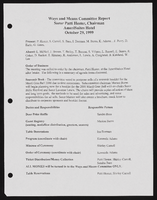
Alpha Kappa Alpha Sorority, Theta Theta Omega Chapter ways and means committee report
Date
Archival Collection
Description
From the Alpha Kappa Alpha Sorority, Incorporated, Theta Theta Omega Chapter Records (MS-01014) -- Chapter records file.
Text
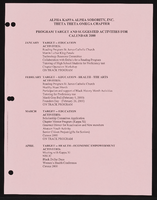
Alpha Kappa Alpha Sorority, Theta Theta Omega Chapter program targets and activities document
Date
Archival Collection
Description
From the Alpha Kappa Alpha Sorority, Incorporated, Theta Theta Omega Chapter Records (MS-01014) -- Chapter records file.
Text
